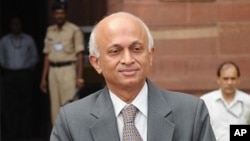India's Manmohan Singh is set to make the first bilateral visit by an Indian prime minister to neighboring Bangladesh since 1999.
A host of ambitious deals are in the cards, including land exchanges and trade expansion. But a major water sharing deal may have to wait, due to domestic Indian opposition.
Indian Prime Minister Manmohan Singh is scheduled to begin his two-day visit to Bangladesh on Tuesday, in a sweep of summit diplomacy many expect to be game-changing.
"The kind of discussions the prime minister will engage in and the levels of cooperation which we expect to enter into with Bangladesh would, I think, create a paradigm shift in our relationship with Bangladesh," said Ranjan Mathai, India's foreign secretary.
India says it is grateful for the sensitivity of Bangladesh's leader, Prime Minister Sheikh Hasina, to India's security concerns. Bangladesh has taken steps in recent years to prevent insurgent elements in India's restive northeast from taking refuge on its territory.
Indian officials say this week's trip is likely to produce agreements to improve transportation links and trade. Foreign Secretary Mathai says India will do more to provide Bangladesh with better trade opportunities.
"We acknowledge that there is a large trade imbalance favoring India, which we are determined to address by providing better market access into India for Bangladeshi goods and we are also thinking of other imaginative measures," he said.
The two countries also aim to resolve the decades-old problem of border demarcation and "enclaves" in each other's countries: tiny patches of land completely surrounded by the other country. An exchange of enclaves is seen as a likely result of Singh's trip.
One major deal that may elude the two leaders on this trip is an agreement to share water from the Teesta River that runs between the two countries.
Mamata Banerjee, the chief minister of West Bengal, the Indian state neighboring Bangladesh, is so far refusing to accompany Prime Minister Singh's delegation. Numerous media reports indicated she is dissatisfied with the terms of the prospective water treaty.
Without her presence, the deal may be off the table for the moment. Mathai says consensus is crucial.
"The subject of water, it is acknowledged, is a very sensitive issue," he said. "In our federal scheme of things, nothing is done or will be done without consultation with the state government."
The two countries are likely to sign a deal giving India expanded access to two major Bangladeshi ports for shipping and exports.




